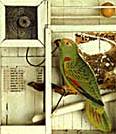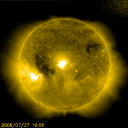Don't Mourn - Organize!: Songs of Labor Songwriter Joe Hill
01/01/1990
Smithsonian Folkways
ubl.artistdirect.com/nad/store/artist/album/0%2C%2C77862%2C00.html
The inclusion of Joan Baez's version of "Joe Hill" on the Woodstock album has been single-handedly responsible for keeping Joe Hill in the public consciousness. Sad but true, for Joe Hill, poet, songwriter, and organizer, was the most popular intentionally proletarian artist in American culture. Not an easy feat, especially considering how many people have tried to be popular proletarian artists.
This album, named after Joe Hill's famous last words before he was executed by the State of Utah, is a testament to Hill's power as a musical and cultural figure. It also attempts to secure his place in our memory;
Baez won't last forever, of
course. The album consists of two elements, Hill songs performed by important interpreters and songs about Hill, again in historically important performances. Among the former, number Harry McClintock singing "The Preacher and the Slave," Pete Seeger doing "Casey Jones (The Union Scab)," and Cisco Houston's version of "The Tramp."
The latter category contains the more varied and more interesting contributions. Among these are poet Kenneth Patchen's spoken word piece "Joe Hill Listens to the Praying," Billy Bragg singing Phil Ochs' "Joe Hill," and both Paul Robeson and Earl Robinson performing the Robinson-penned number Baez made her own, "Joe Hill," with its classic line, "I never died said he."
Excellent as an album and as a cultural document, hopefully this album will not let us forget the important
legacy, a sense of purpose, Joe Hill bequeathed to our culture. ~ Brian Whitener, All Music Guide
Low, dishonest decade
6 years ago






No comments:
Post a Comment